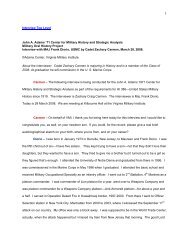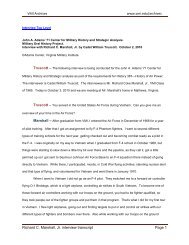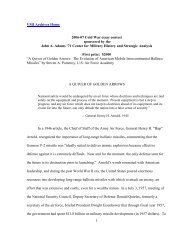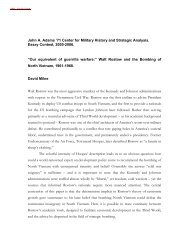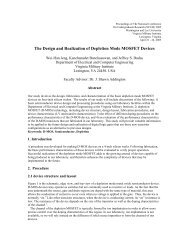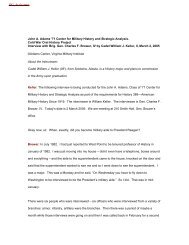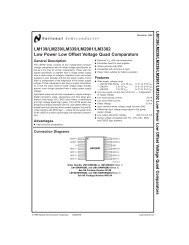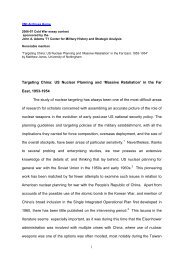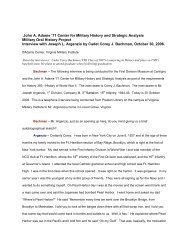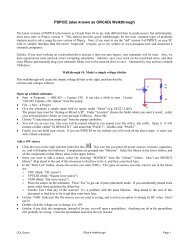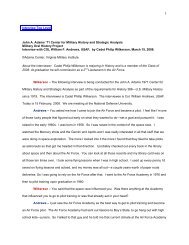Academic Catalog - Virginia Military Institute Admissions
Academic Catalog - Virginia Military Institute Admissions
Academic Catalog - Virginia Military Institute Admissions
You also want an ePaper? Increase the reach of your titles
YUMPU automatically turns print PDFs into web optimized ePapers that Google loves.
BIOLOGY CURRICULA<br />
The mission of the VMI biology department is to broadly train students to understand how living organisms function and to<br />
appreciate the intricacies and interactions that govern all living systems. This mission supports the broader VMI mission of creating<br />
citizen soldiers, by equipping students to make informed decisions that will better society. We accomplish this by providing students<br />
with broad training and a fundamental background in the biological sciences, while providing the opportunity to specialize in the subdisciplines<br />
described under “<strong>Academic</strong> Concentrations in Biology.” In addition, attainment of teacher certification is possible. The<br />
degree programs are particularly good at preparing majors to pursue post-graduate education in the biological and health sciences<br />
and allow for specialization that matches student interests and career plans. Faculty members believe that interaction with cadets<br />
in the classroom, laboratory, and on an individual basis is critical in the development of the successful biology major. In keeping<br />
with this philosophy, class sizes are small, laboratories accompany most courses, advising is conducted on an individual basis,<br />
and undergraduate research is encouraged. The biology department also provides a summer research experience. The Dr. Fred<br />
C. Swope Summer Scholars Program is an intensive, ten-week program that introduces selected students to the scientific method,<br />
research design and data analysis, data presentation, use of sophisticated laboratory instruments, and independent research. Each<br />
student conducts a research project under the guidance of a faculty mentor. This research is at the “cutting edge” of science, and<br />
student/faculty publications have resulted from these projects. Normally, cadets are selected to participate in this program between<br />
their second and first class years. Many additional opportunities for undergraduate research exist, allowing students to engage in a<br />
one-on-one interaction with a faculty mentor in their area of interest as early as the summer following the fourth class (freshman) year.<br />
B.S. Curriculum<br />
Common Core Course Requirements<br />
All B.S. Biology majors are required to complete the<br />
following courses:<br />
BI 101 General Biology I<br />
BI 102 General Biology II<br />
BI 103 Biological Diversity and Systematics I<br />
BI 104 Biological Diversity and Systematics II<br />
BI 205 Genetics<br />
Capstone Experience (3 credits)<br />
In addition to these courses, a B.S. major must select one<br />
course from each of the following core area pairings:<br />
BI 312 Ecology, BI 410 Evolutionary Biology,<br />
BI 311 Aquatic Ecosystems, or BI 317 Herpetology<br />
BI 304 Comparative Vertebrate Morphology, BI 217 Botany,<br />
BI 303 Developmental Biology, or BI 405 Histology<br />
BI 335 Neurobiology, BI 204 Physiology, BI Plant Physiology,<br />
or BI 323 Exercise Physiology<br />
BI 404 Cell Biology, BI 430 Molecular Biology, or<br />
BI 411 Immunology<br />
Additional hours (11-13) must be selected from any area<br />
within the biology curriculum except for research hours to total 45<br />
hours in biology. In addition to the biology courses, B.S. majors<br />
must complete two semesters of Organic Chemistry with lab (CH<br />
223 and 225, CH 224 and 226), CH 322 Biochemistry, Quantitative<br />
Analysis I and II (MA 125 and 126), and General Physics I and II (PY<br />
120 and PY 115, PY 121 and PY 116). To broaden the education,<br />
six credits of English (EN) or Writing (WR) above the 100 level are<br />
required. Additionally, 12 non-science elective credits must be<br />
completed in English, history, economics, business, psychology,<br />
philosophy, fine arts, political science, or modern languages. The<br />
remainder (9) of the 135 hours required for graduation can be<br />
taken from any department on post. Cadets completing the B.S.<br />
degree often complete minors in other disciplines. A minor in<br />
chemistry can be completed by taking one additional course from<br />
selected courses in the chemistry curriculum. The requirements<br />
for minors in psychology, English, or history, for example, fit in<br />
well to our elective requirements.<br />
B.A. Curriculum<br />
Common Core Course Requirements<br />
The B.A. curriculum is designed for those majors who require<br />
greater flexibility in their degree requirements, including pursuit of<br />
minors in other departments. All B.A. Biology majors are required<br />
to complete the following courses:<br />
BI 101 General Biology I<br />
BI 102 General Biology II<br />
BI 103 Biological Diversity and Systematics I<br />
BI 104 Biological Diversity and Systematics II<br />
BI 205 Genetics<br />
Capstone Experience (3 credits)<br />
In addition to these courses, a B.A. major must select one course<br />
from each of the following core area pairings:<br />
BI 312 Ecology, BI 410 Evolutionary Biology,<br />
BI 311 Aquatic Ecosystems, or BI 317 Herpetology<br />
BI 304 Comparative Vertebrate Morphology, BI 217 Botany,<br />
BI 303 Developmental Biology, or BI 405 Histology<br />
BI 335 Neurobiology, BI 204 Physiology, BI Plant Physiology,<br />
or BI 323 Exercise Physiology<br />
BI 404 Cell Biology, BI 430 Molecular Biology, or<br />
BI 411 Immunology<br />
Additional hours (11-13) must be selected from any area<br />
within the biology curriculum except for research hours to total 45<br />
hours in biology. In addition to the biology courses, B.A. majors<br />
must complete Quantitative Analysis I and II (MA 125 and 126)<br />
and show proficiency in a foreign language through the 200 level.<br />
Cadets in the B.A. major must complete either two semesters of<br />
organic chemistry with lab (CH 223 and 225, CH 224 and 226)<br />
or General Physics I and II (PY 120 and PY 115, PY 121 and PY<br />
116). To broaden the education, six credits of English above<br />
the 100 level are required. Additionally, 12 non-science elective<br />
credits must be completed in either English (EN) or Writing (WR),<br />
history, economics, business, psychology, philosophy, fine arts,<br />
political science, or modern languages. The remainder (9) of<br />
the 135 hours required for graduation can be taken from any<br />
department on post. Cadets completing the B.A. degree often<br />
35





